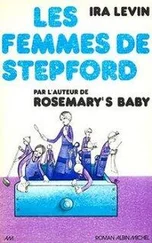Liebermann sat silently for a moment. He put his fork down and took the napkin from his lap and put it on the table. “Excuse me,” he said, and got up and went out of the kitchen.
Lena looked after him, looked at his plate, looked at Klaus.
“It’s not that,” he said.
“I hope not,” she said, and pressed the side of her fork into her meat loaf.
Klaus looked beyond her; watched Liebermann go to the bookshelves in the other room.
“Not that this isn’t excellent meat,” Nürnberger said, “but we’ll all be eating much better meat some day, and much cheaper, thanks to mononuclear reproduction. It’ll revolutionize cattle-breeding. And it’ll also preserve our endangered species, like that beautiful leopard there.”
“You’re defending it?” Klaus asked.
“It doesn’t need defending,” Nürnberger said. “It’s a technique, and like any other technique you can mention, it can be put to either good or bad uses.”
“I can think of two good ones,” Klaus said, “and you just mentioned them. Give me a pencil and paper and five minutes and I’ll give you fifty bad ones.”
“Why must you always take the opposite side?” Lena asked. “If the professor had said it’s a terrible thing, you’d be talking now about cattle-breeding.”
“That’s not true at all,” Klaus said.
“It is so. He’ll argue against his own statements.”
Klaus looked beyond Lena; saw Liebermann standing in profile, head bent to an open book, rocking slightly: Jew at prayer. Not a Bible, though; they didn’t have one. Liebermann’s own book? He was standing just about where it was. Checking on the colonel’s eyes? “Klaus?” Lena offered the salad bowl.
He took it.
Lena turned and looked, turned back to the table.
Nürnberger said, “I’m going to have a hard time keeping my mouth shut about this.”
“You must, though,” Klaus said.
“I know, I know, but it won’t be easy. Two of the men in the department have tried it themselves, with rabbit ova.”
Liebermann stood in the doorway, ashen and beaten-looking, his glasses hanging from the hand at his side.
“What is it?” Klaus put the bowl down.
Nürnberger looked; Lena turned in her chair.
Liebermann said to Nürnberger, “Let me ask you a foolish question.”
Nürnberger nodded.
“The one who gives the nucleus,” Liebermann said. “The donor. He has to be alive, yes?”
“No, not necessarily,” Nürnberger said. “Individual cells are neither alive nor dead, only intact or not intact. With a lock of Mozart’s hair—not even a lock; with a single hair from Mozart’s head—someone with the skill and equipment”—he smiled at Klaus—“ and the women”—he looked back at Liebermann—“could breed a few hundred infant Mozarts. Find the right homes for them and we’d wind up with five or ten adult Mozarts, and a lot more beautiful music in this world.”
Liebermann blinked, took an unsteady step forward, shook his head. “Not music,” he said. “Not Mozart.” He brought his hand from behind his back and showed them Hitler; the paperback book bore three black brush-strokes: mustache, sharp nose, forelock.
Liebermann said, “His father was a civil servant, a customs officer. He was fifty-two when… the boy was born. The mother was twenty-nine.” He looked around for someplace to put the book, found no place, put it on one of the stove’s burners. He looked at them again, wiped his hand against his side. “The father died at sixty-five,” he said. “When the boy was thirteen, almost fourteen.”
They left everything on the table and went in and sat in the other room, Liebermann and Klaus on the daybed again, Nürnberger on the campstool, Lena on the floor.
They looked at the empty glasses on the trunk before them, the bowls of carrot-sticks and almonds. They looked at one another.
Klaus picked up a few almonds, tossed them on his palm.
Liebermann said, “Ninety-four Hitlers,” and shook his head. “No,” he said. “No. It’s not possible.”
“Of course it isn’t,” Nürnberger said. “There are ninety-four boys with the same genetic inheritance as Hitler . They could turn out very differently. Most of them probably will.”
“Most,” Liebermann said. He nodded at Klaus and at Lena. “ Most .” He looked at Nürnberger. “That leaves some ,” he said.
“How many?” Klaus asked.
“I don’t know,” Nürnberger said.
“You said five or ten Mozarts out of a few hundred. How many Hitlers out of ninety-four? One? Two? Three?”
“I don’t know ,” Nürnberger said. “I was talking. No one really knows.” He smiled wryly. “The frogs weren’t given personality tests.”
“Make a guess,” Liebermann said.
“If the parents were matched only by age, race, and the father’s occupation, I’d say the prospects were pretty poor. From Mengele’s viewpoint, I mean; pretty good from ours.”
“But not perfect,” Liebermann said.
“No, of course not.”
“Even if there were only one,” Lena said, “there would still be a chance of his…being influenced the right way. The wrong way.”
Klaus said to Liebermann, “Do you remember what you said at the lecture? Someone asked you if the neo-Nazi groups were dangerous, and you said not now, only if social conditions got worse—which God knows they’re doing every day—and another leader like Hitler appeared.”
Liebermann nodded. “Speaking to the whole world at once,” he said, “by television satellite. God in heaven.” He closed his eyes, put his hands to his face, and wiped his fingers across his eyelids, pressing hard.
“How many of the fathers have actually been killed?” Nürnberger asked.
“That’s right! ” Klaus said. “Only six! It’s not as bad as it seems!”
“Eight,” Liebermann said, lowering his hands, blinking his reddened eyes. “You’re forgetting Guthrie in Tucson, and the one between him and Curry. Others, too, that we don’t know about in the other countries. More at the beginning than later on; that’s how it was in the States.”
Nürnberger said, “The initial batch must have had a higher success-ratio than he expected.”
“I can’t help feeling,” Klaus said, “that you’re a little bit pleased by the achievement.”
“Well, you have to admit that strictly from a scientific viewpoint, it’s a step forward.”
“Jesus Christ! Do you mean you can sit there and—”
“Klaus,” Lena said.
“Oh—shit.” Klaus slapped the almonds down.
Liebermann said to Nürnberger, “I’m going to Washington tomorrow to speak to their Federal Bureau of Investigation. I know who the next father there is; they could trap the killer, they have to trap him. Will you come with me and help convince them?”
“Tomorrow?” Nürnberger said. “I can’t possibly .”
“To prevent a new Hitler?”
“God!” Nürnberger rubbed his brow. “Yes, of course,” he said, “if you absolutely need me. But look, there are men there, at Harvard, Cornell, Cal Tech, whose credentials are much more impressive than mine and who would in any case carry more weight with American authorities simply by virtue of being American. I can give you names and schools if you’d like—”
“I would, yes.”
“—and if for any reason you do want me, I will come over.”
“Good,” Liebermann said. “Thank you.”
Nürnberger took a pen and a black leather memo pad from inside his jacket. “Shettles himself would probably help you,” he said.
“Put his name down,” Liebermann said. “And where I can reach him. Put down everyone you can think of.” To Klaus he said, “He’s right, an American is better. Two foreigners, they’ll kick us out on our asses.”
Читать дальше











